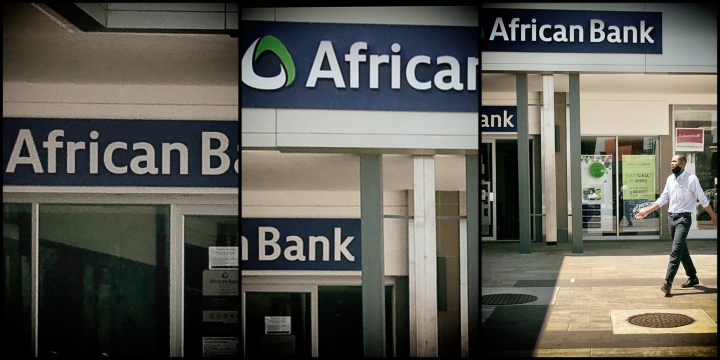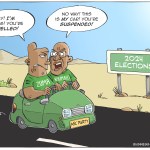BUSINESS MAVERICK
Red flags at African Bank after CEO suddenly resigns and lender reports a loss of R27-million

Ahead of bank reporting season in March, annual results from African Bank provide an insight into the depths of pain experienced by individual South Africans in the current economy. That said, the bank is in a unique situation, which may not be a reflection of the banking sector as a whole.
Whatever spin you put on it, it does not reflect well on a company when the CEO resigns suddenly, particularly the day before the presentation of the annual results and in the middle of a complex business turnaround.
And so it was with Basani Maluleke, who has been CEO of African Bank since April 2018 and who suddenly announced that she will leave the bank in April to pursue other “career opportunities”.
When it comes to the financial results for the year to September 2020, it is not unexpected that SA’s sixth-largest bank has not fared well in this challenging economic environment, made worse by the Covid-19 pandemic, lockdowns and ensuing job losses.
Under the circumstances, the bank had no choice but to curb credit extension and impair a hefty portion of its book.
In addition, its sister company, African Insurance Group, which holds an investment in Guardrisk, has experienced an increased number of actual and expected claims.
This has had a material impact on the performance of holding company ABH. This is an unlisted vehicle owned by the South African Reserve Bank (SARB), the Government Employees’ Pension Fund and SA’s biggest banks — Absa, Capitec, FirstRand, Investec, Nedbank and Standard Bank.
ABH reported a net loss after tax of R27-million for the year to 30 September 2020. It earned R1.2-billion the previous financial year.
Things look less rosy when the bank’s results are stripped out of the group. African Bank reported a net loss after tax of R560-million for the year, down from R267-million profit in the previous year.
A large part of this are the forward-looking credit impairments. The group’s credit impairment charge rose 58% to R3.04-billion.
While the impairment is significant, it must be understood in terms of accounting rules, which force a bank to impair losses it “thinks” will occur, rather than those that have already occurred.
In the face of darkening economic clouds, the bank began to tighten its credit lending criteria in September 2019. It tightened them again in April 2020 and again in August. As a result, new loans disbursed were down 37% year on year and overall loans declined by 5% to R28.3-billion during its 2020 year. This will have a bearing on revenue earned in years to come.
On the positive side, retail customer deposits, including transactional banking balances, rose 149% to R5.9-billion from R2.3-billion.
This is a sign that efforts to diversify away from credit and provide customers with a full transactional banking solution are gaining traction.
Considerable effort is also being made to evolve into a digital bank with the addition of digital platforms; direct sales and web-originated loans.
The balance sheet remains robust with R6.9-billion in available cash resources to support growth initiatives.
Diversifying the bank away from simply providing customers with credit has been a key focus, says Maluleke.
Mergers and acquisitions are also a key part of the growth strategy. The bank is looking to acquire or merge with similar businesses that will provide it with the scale necessary to leverage its cost base, she says.
“We have identified businesses that have similar aspirations, values and products to our own and where there is a high probability for the realisation of business and cost synergies.”
Complicating this process is M&A activity on a higher level. Its largest shareholder, the SARB, has announced that it intends disposing of its 50% stake in the bank. To this end, the Bank of America, Moshe Capital and Rothchilds have been appointed as transaction advisers to identify possible acquirers or an alternative strategy that would see the SARB’s shareholding reduced to zero.
This makes sense. The SARB cannot be both referee and shareholder. It correctly points out that when it placed African Bank under curatorship in 2014 and assumed a 50% shareholding following a restructuring proposal, the intention was not to remain invested in the bank.
On the face of it, African Bank is a victim of a poor economic climate, particularly given that its target market — lower- and middle-income South Africans — have been hardest hit over the past year.
However, there are a few red flags that should be watched, says Gryphon Asset Management portfolio manager Reuben Beelders.
The biggest is the sudden resignation of the CEO.
“She’s either been offered a great job at another institution, which is plausible, or she’s seen the future and doesn’t like it, which is even more plausible.”
Another concern is the S189A process that’s been embarked upon. On the one hand, it could be that the bank is looking to become more efficient and reduce costs — as every other bank is doing. On the other, it’s possible that the “virtual banks” are taking market share, particularly as consumers become more comfortable online.
“I think it’s the latter, to a large degree. In this segment of the market it’s possible to provide credit without having physical branches.”
Under the circumstances, the sooner the SARB (and the other banks) can exit, and the sooner African Bank can bulk up via mergers or acquisitions, the better. DM/BM
- Business Day reported last night that Basani’s sudden departure had been prompted by a personality clash with African Bank chair Thabo Dloti. The report, quoting “people familiar with developments”, said the working relationship had become intolerable over a period of time for the CEO.

















Comments - Please login in order to comment.